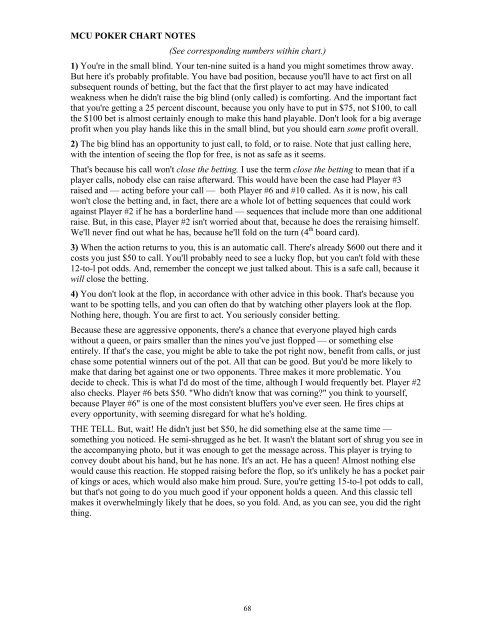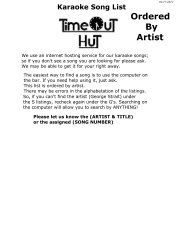+Mike Caro - Caros Book Of Poker Tells.pdf - Time Out Hut
+Mike Caro - Caros Book Of Poker Tells.pdf - Time Out Hut
+Mike Caro - Caros Book Of Poker Tells.pdf - Time Out Hut
Create successful ePaper yourself
Turn your PDF publications into a flip-book with our unique Google optimized e-Paper software.
MCU POKER CHART NOTES<br />
(See corresponding numbers within chart.)<br />
1) You're in the small blind. Your ten-nine suited is a hand you might sometimes throw away.<br />
But here it's probably profitable. You have bad position, because you'll have to act first on all<br />
subsequent rounds of betting, but the fact that the first player to act may have indicated<br />
weakness when he didn't raise the big blind (only called) is comforting. And the important fact<br />
that you're getting a 25 percent discount, because you only have to put in $75, not $100, to call<br />
the $100 bet is almost certainly enough to make this hand playable. Don't look for a big average<br />
profit when you play hands like this in the small blind, but you should earn some profit overall.<br />
2) The big blind has an opportunity to just call, to fold, or to raise. Note that just calling here,<br />
with the intention of seeing the flop for free, is not as safe as it seems.<br />
That's because his call won't close the betting. I use the term close the betting to mean that if a<br />
player calls, nobody else can raise afterward. This would have been the case had Player #3<br />
raised and — acting before your call — both Player #6 and #10 called. As it is now, his call<br />
won't close the betting and, in fact, there are a whole lot of betting sequences that could work<br />
against Player #2 if he has a borderline hand — sequences that include more than one additional<br />
raise. But, in this case, Player #2 isn't worried about that, because he does the reraising himself.<br />
We'll never find out what he has, because he'll fold on the turn (4 th board card).<br />
3) When the action returns to you, this is an automatic call. There's already $600 out there and it<br />
costs you just $50 to call. You'll probably need to see a lucky flop, but you can't fold with these<br />
12-to-l pot odds. And, remember the concept we just talked about. This is a safe call, because it<br />
will close the betting.<br />
4) You don't look at the flop, in accordance with other advice in this book. That's because you<br />
want to be spotting tells, and you can often do that by watching other players look at the flop.<br />
Nothing here, though. You are first to act. You seriously consider betting.<br />
Because these are aggressive opponents, there's a chance that everyone played high cards<br />
without a queen, or pairs smaller than the nines you've just flopped — or something else<br />
entirely. If that's the case, you might be able to take the pot right now, benefit from calls, or just<br />
chase some potential winners out of the pot. All that can be good. But you'd be more likely to<br />
make that daring bet against one or two opponents. Three makes it more problematic. You<br />
decide to check. This is what I'd do most of the time, although I would frequently bet. Player #2<br />
also checks. Player #6 bets $50. "Who didn't know that was corning?" you think to yourself,<br />
because Player #6" is one of the most consistent bluffers you've ever seen. He fires chips at<br />
every opportunity, with seeming disregard for what he's holding.<br />
THE TELL. But, wait! He didn't just bet $50, he did something else at the same time —<br />
something you noticed. He semi-shrugged as he bet. It wasn't the blatant sort of shrug you see in<br />
the accompanying photo, but it was enough to get the message across. This player is trying to<br />
convey doubt about his hand, but he has none. It's an act. He has a queen! Almost nothing else<br />
would cause this reaction. He stopped raising before the flop, so it's unlikely he has a pocket pair<br />
of kings or aces, which would also make him proud. Sure, you're getting 15-to-l pot odds to call,<br />
but that's not going to do you much good if your opponent holds a queen. And this classic tell<br />
makes it overwhelmingly likely that he does, so you fold. And, as you can see, you did the right<br />
thing.<br />
68



